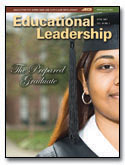Listen in. Marge Scherer, EL's Editor in Chief, reads her April 2007 Perspectives column “Are They Ready?” in this bonus MP3.
I have two nieces preparing to be graduates. The high school senior has been accepted into pharmacy school. We are proud. I ask her why she wants to be a pharmacist, and she replies, eyes wide, “Do you know how much money pharmacists make?” The aunt raises an eyebrow. “That's what you wrote on your college application?” The niece rolls her eyes.
My older niece, a sophomore in college, has found her passion: art and photography. She is astounding herself with what she is learning in these subjects but is studying few other subjects. She is worried about a future career. On a visit home, eyeing a delivery man on his route, she asks her dad only half jokingly, “Maybe I could do that after graduation?” Time for Dad to roll his eyes.
A colleague shares her story about her son, who, after a rocky start, is making a strong finish as a biology major at a prestigious university. “Mom,” he asked, “You know, I graduate in May. Then what do I do?” A collective rolling of eyes.
Are the kids we love and teach prepared for life and work? The older generation and the younger have something in common: We don't know. The work prospects for the younger generation have changed. Whereas they used to say adults should be prepared to change jobs at least seven times in a career, today's students must prepare for jobs that don't yet exist and may become obsolete during their lifetime.
One thing we know is that our students do need to graduate. Unlike in previous generations, few jobs in industry or business beckon to those with no degree. The benefits of graduation are—at the least—monetary. Workers with a high school degree will outearn those who do not graduate by more than half a million dollars, and college grads will outearn high school graduates by more than a million dollars.
In this issue of Educational Leadership, our authors describe the characteristics, skills, and knowledge that students will need to survive and thrive, not only monetarily but also in terms of life satisfaction in the years ahead. They also suggest ways that schools must change to equip the kinds of minds our students' new world will demand.
Vivien Stewart (p. 8) discusses what will be important for young people to know about their world. To communicate with people all over the globe and tackle immense global problems—from Avian flu to disaster recovery—students will need to apply knowledge of world geography, history, current events, and, most especially, languages. Among her recommendations for schools: Create new high school requirements to promote international knowledge and skills and develop world-language pipelines from primary school to college.
David T. Conley (p. 23) addresses college readiness. He notes that only 35 percent of students who enter four-year colleges exit with a degree in four years. Too many students flounder in college courses or do not cope with the fast pace and competitive atmosphere of many colleges. “The evolving needs of students compel us to make changes in the relationship between high schools and colleges,” he writes. His recommendations: Align high school curriculum and instruction with college expectations; develop rigorous courses (add more writing, for example); and design senior seminars that imitate the college/work experience meaningfully.
Mel Levine (p. 16) is concerned with making sure that students are prepared for the real world, whether college or work. The skills that he recommends range from knowing how to interpret complex texts and situations to knowing how to organize one's thinking, time, and space. He argues that students need a “working capacity,” a complex amalgam of motivation and stamina to pursue important activities that are not instantly gratifying.
Two recent books ponder the unpredictable future. In A Whole New Mind(Riverhead Trade, 2006), Daniel H. Pink suggests that we are entering a post-Information-Age Conceptual Age. The knowledge worker's mind will need to expand, making use of its designing, storytelling, creative side. Not that analysis, technology, and information gathering will be lost arts, but the new graduate will have to have those qualities and more. “The MFA will be the new MBA,” he says. (Arts majors, take heart.)
In Five Minds for the Future (Harvard Business School Press, 2007), Howard Gardner asks an additional, more important question: What kind of minds do we need if we are to create a world in which we would like to live? His answer: Graduates will need to cultivate a disciplinary mind (mastery of a major school of thought and at least one professional craft); a synthesizing mind; a creating mind; a respectful mind; and an ethical mind (one willing to take on responsibilities as a world citizen).
All our prognosticators issue tall orders. Will our kids be ready? Ready or not, they are on their way.


